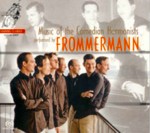If you haven’t heard of the Comedian Harmonists–the six-man vocal group (five singers and a pianist) formed in Berlin in 1927 and forced to disband eight years later for having three Jewish members–you should rent the movie, read the many articles available on the web, and you certainly should listen to this CD. The group’s founder, Harry Frommermann (obviously the source of this modern Dutch ensemble’s name!), envisioned a quintet of singers that would entertain with exceptionally polished musicianship, first-rate arrangements, and–very importantly–humor. In fact, much of the Comedian Harmonists’ popularity with audiences stemmed from their well-practiced, artful (and funny) imitation of various instruments–kazoos, horns, trombones, flutes, guitars–and their ability to bring an infectious personality to their performances.
And we certainly get plenty of all of the above-mentioned characteristics here: we don’t have to actually see these six singers to know the sheer fun they’re having; and their musicianship is beyond question. Songs such as “Stormy Weather” and “Night and Day” (Nuit et Jour) unashamedly revel in sheer schmaltz, while “Kannst du pfeifen Johanna?”, and “Der Onkel Bumba aus Kalumba” are riotous examples of the kinds of songs one might have heard in Sally Bowles’ infamous Kit Kat Klub. Of course, the real test of the singers’ virtuosity comes in the arrangement of Rossini’s Barber of Seville overture, a classic of the genre (yes, there is a genre!) and a real tour de force that these superb musicians nail convincingly, and again, with the requisite, irresistible humor. But they also sing German partsongs and cabaret numbers with equal sensitivity, precision, and attention to blend and emotional effect.
You may remember a King’s Singers recording from the mid-1980s called “A Tribute to the Comedian Harmonists” (EMI); and that’s just what it was–a tribute, with newly arranged versions of some of the original group’s most popular repertoire. As excellent as that recording was (and the singing really is extraordinary), this one offers many of the group’s original arrangements and thus more realistically captures the flavor of Harry Frommermann’s unique–and still unsurpassed–creation. These performances project a live-concert spontaneity and energy, enhanced by the realistic, best-seat-in-the-cabaret ambience. Highly recommended! [2/18/2008]
































